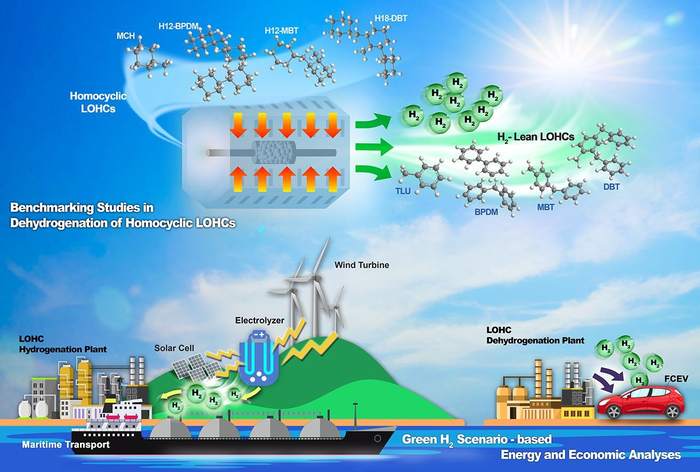Reviewed by Alex SmithSep 27 2021
The clean energy supply chain potential of hydrogen is creating a lot of interest worldwide. A typical technique of hydrogen storage is physically storing hydrogen via compression or liquefaction, which needs more energy to enhance storage capacity and expensive distribution infrastructure.
 Graphical Abstract. Image Credit: Korea Institute of Science and Technology.
Graphical Abstract. Image Credit: Korea Institute of Science and Technology.
To address these limitations, the researchers attempted to store hydrogen chemically in liquid carriers, such as liquid organic hydrogen carriers (LOHCs) or ammonia. Specifically, it is possible to safely store hydrogen in LOHCs at room temperature and atmospheric pressure before being extracted at locations for hydrogen consumption.
Several organic compounds have been proposed for LOHCs. However, only a few relative studies have been done on LOHC performance, resulting in a lack of scientific consensus in the hydrogen community for down-selecting LOHCs and catalysts.
Researchers at the Korea Institute of Science and Technology (KIST) have added to the development of a high-performance benchmarking protocol for the incorporation of promising LOHCs and their suitable catalysts.
The KIST LOHC research team in the Hydrogen and Fuel Cell Research Center was led by Dr. Yongmin Kim. The team designed a semi-automatic verification system for LOHC dehydrogenation (alternatively, hydrogen extraction from LOHC). This system enables robust testing of dehydrogenation in well-defined and standardized reaction conditions and executes comparative analysis to yield an ideal solution to achieve commercial deployment of LOHCs.
An instance of LOHC in the analysis is methylcyclohexane (MCH) with high technological readiness. It exposes a higher dehydrogenation rate low byproduct formation. Monobenzyltoluene (MBT) is another promising option as it is mass-produced as a safe chemical with faster hydrogen extraction.
A biphenyl-based eutectic mixture developed by KIST in 2017 shows a 20% higher dehydrogenation rate than those of other LOHCs. This biphenyl-based LOHC with a high-level hydrogen storage density of 6.85 wt.%-H2 is applicable for onboard hydrogen storage such as in hydrogen vehicles or trains.
The technique proposed for quicker screening on LOHCs materials and catalysts will also support both domestic and international research collaborators in industry and academia.
Further to the present progressing research association with Hyundai Motor Group and Korea Gas Corporation, international collaborative research projects with Germany and Japan are proposed to broadly disseminate this generalized benchmarking LOHC study platform for accelerating LOHC deployment in the hydrogen economy.
The as-developed platform will help develop new technology for lower cost and energy consumption, which are two key bottlenecks for the commercialization of LOHC.
Dr. Yongmin Kim, Korea Institute of Science and Technology
Journal Reference:
Kwak, Y., et al. (2021) Hydrogen production from homocyclic liquid organic hydrogen carriers (LOHCs): Benchmarking studies and energy-economic analyses. Energy Conversion and Management. doi.org/10.1016/j.enconman.2021.114124.